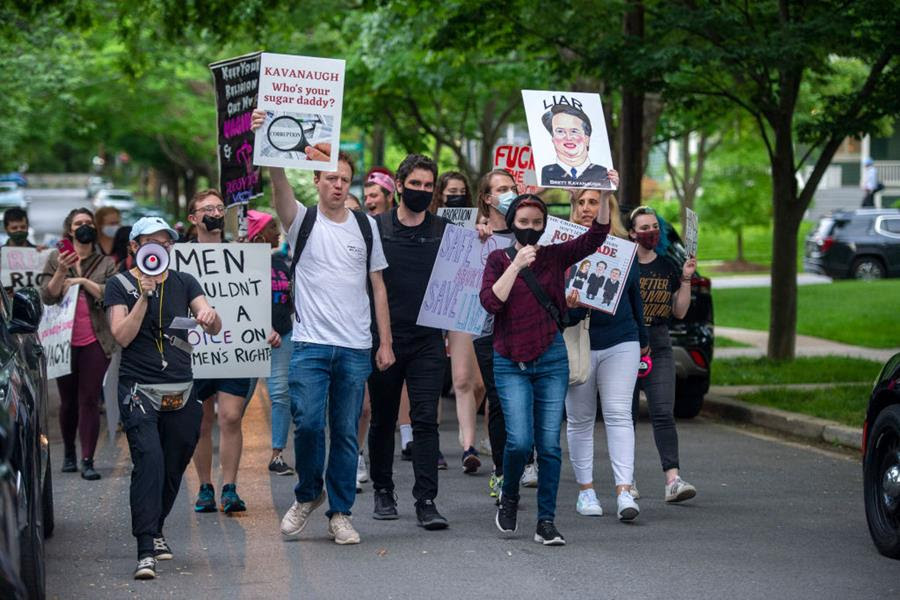“It’s Going to be Fucking Chaos”
BY SAMHITA MUKHOPADHYAY
As you know, the Supreme Court of the United States of America is set to overturn Roe v. Wade. The decision could come as early as tomorrow or likely in the next 10 days. If our worst fears are realized, this decision would set women’s rights and the rights of anyone with a uterus back generations.
In the days, weeks, months, and years ahead there will be, most likely, a lot of thinking, strategizing, protesting, and rabble-rousing (along with crying and fist-shaking). The path forward will be a long one. But what should we do in the very short term—the moment the decision comes in?
In anticipation of this moment, I sat down with Renee Bracey Sherman, a decades-long reproductive justice leader who, through her organization We Testify, has worked to elevate the stories of people who have had abortions. She also led the charge on the steps of the SCOTUS on the day the court heard oral arguments on Dobbs v. Jackson Women’s Health Organization, the case that will determine the future of abortion rights.

Samhita Mukhopadhyay: So, say the abortion decision comes in and it’s what we expect—meaning it overturns Roe v. Wade. What do the next 24 hours look like, especially in trigger-ban states? What happens if you have an appointment?
Renee Bracey Sherman: My real answer is just, it’s going to be fucking chaos, utter chaos.
In states with the trigger bans, [say] someone is in a clinic waiting for care—they might be mid-care, mid-counseling. And I just really feel for those people who will schedule their appointment and go in and get as far as doing the counseling, doing the ultra[sound], maybe even have their legs in the stirrups, and then when the decision comes down, [they] will have to get off the examination table. And I don’t know that people realize how heartbreaking that’s going to be.
And then they’re not going to be able to just go down to another clinic on the street or not even to the next state. And we’ve already seen the cruelty of states like Oklahoma, that saw that people [coming from Texas, where abortion is largely already banned] needed care, and then turned around and said, “Cool, we’re going to get rid of this so you can’t come here.”
We’ll [also] have lawyers reading through the decision. Let’s say we are overturning or reversing Roe v. Wade and Planned Parenthood v. Casey. But then you have to [look] at the fine print of the decision. What about Roe is wrong? What about Casey is wrong? Are there legal grounds for us to sue? What is that in comparison to what the state laws are, or the state statute? What laws are still on the books? Because there are a lot of places where laws from the 1800s are still on the books. Roe [negated] those. Do those laws go back into effect? Is there kind of a cross mix? It’s pure chaos.
A lot of clinics will have to stop providing immediately because of the trigger bans, but also because their lawyers are going to advise them to stop until they can read through the decision and assess the level of risk.
And it’s not going to be [just] 24 hours, but months and maybe even a year, because there’s going to be lawsuits. And so there are questions of, “Can we provide abortions today? Can we not?”
And I think that’s the saddest part about it: that people are just not going to be able to have clear information. So what we’re asking people to do is to avoid at all costs the sensationalism and the wanting to freak out. Because people are trying to get abortions in that moment and they won’t know whether this tweet is correct or this information is correct, and it’s just exhausting and chaotic.
And I don’t know that people realize how heartbreaking that’s going to be.
It’s interesting to consider the idea of staying calm at that moment.
Somebody did a tweet saying that Plan B had been banned in a state and that tweet got tens of thousands of retweets. Plan B hasn’t been banned anywhere! Your insurance might not cover it and that sucks, but it’s not banned. The anti-abortion movement has a vested interest in sowing dysfunction and chaos because they don’t want anyone to be able to get an abortion. What they want is for people to think, This is just too hard, I’m going to go to jail. It’s going to be bad. It’s going to be unsafe, and give up.
The thing is that, as we’ve known for the last 4,000 years, people who have abortions never give up. We’ve been doing it for a long time. We will keep doing it. That’s not going to change, but what we can do is ask people to take a breath and fact-check the information before spreading it widely and turning into alarmists. Is that a word?
That is a word! This idea of keeping calm and making sure your information is accurate, that’s a really important call to action. What other advice do you have for people who want to help right after the decision? Should we hit the streets? Should we be chaining ourselves to fire hydrants?
We need all tactics. People absolutely should take to the streets and protest and make their voices heard. I do love a good protest and I want to make sure that we don’t have a couple of protests and then it dies off and people go back to accepting this as the new status quo and normalize this, which I feel is what’s happened over the last decade.
What’s really challenging at this moment is that we are being attacked from eight million different directions and so people do lose interest, because there’s another tragedy or another horrible decision to come down. So how do we keep the stamina to actually make a change so that the people who are harmed in the process aren’t forgotten?
Yes, absolutely protest. Absolutely vote, for sure. Vote for pro-abortion candidates up and down. Become a single-issue voter. If your candidate is not super supportive of abortion, I promise you they’re probably not good on a whole lot of other issues either. I’ve never met an anti-abortion candidate who was excellent on Medicaid coverage of healthcare and immigration and literally everything else.
But then getting involved in your community is really what I ask people to do. Open up to your community. Become a person that people can go to, to receive care. Whether that’s opening up your home, opening up your car for rides, giving up your time at a local clinic or clinic defense, if that’s what the clinic wants. And then, of course, show up and become a monthly donor to your local abortion fund. Also, know the self-managed abortion protocol. You may not need it, but someone in your life may need it.
I think it’s really, really essential that people look around at what’s happening in their communities because there is a lot of work happening already. You do not have to recreate the wheel. Do not try to create an “underground railroad”; just stop. That’s really anti-Black language. It’s terrible. Just get involved with the people who are doing [that kind of work already] because there are a lot of security protocols and if you can’t give of your time or your money, that’s fine. You can just show up with love and support for the people in your life who need abortions and start the conversation at home. That’s really where we need to do the work.
You’ve been doing reproductive justice work for over a decade. How are you feeling right now?
I feel like I constantly swing between tired, frustrated, feeling a lot of despair, and also feeling like this sucks [but] we’ve got this. And I think there are days that it’s extremely draining because we didn’t have to be here if people [had taken] racial justice, economic justice, access to healthcare, and feminism seriously. But also, I’m in the middle of co-writing a book on the history of Black and brown people’s experiences with abortion, and in working on that…I feel a little bit hopeful. Reading a lot of books on the history of abortion, it puts it in perspective when I’m thinking about this as something that’s been [an] issue for thousands of years.
So I have to just remember that this moment in time is one blip on the large, expansive history of humankind and the history of abortion and that there has always been some sort of white supremacist, white Christian nationalist forces to try to tamp down, not just abortion, but sex and sexuality and people just living their lives. So I have to go, “Okay, this is part of it, and we can survive through this.”

Samhita Mukhopadhyay is a writer, editor, and speaker. She is the former Executive Editor of Teen Vogue and is the co-editor of Nasty Women: Feminism, Resistance and Revolution in Trump’s America and the author of Outdated: Why Dating is Ruining Your Love Life, and the forthcoming book, The Myth of Making It.